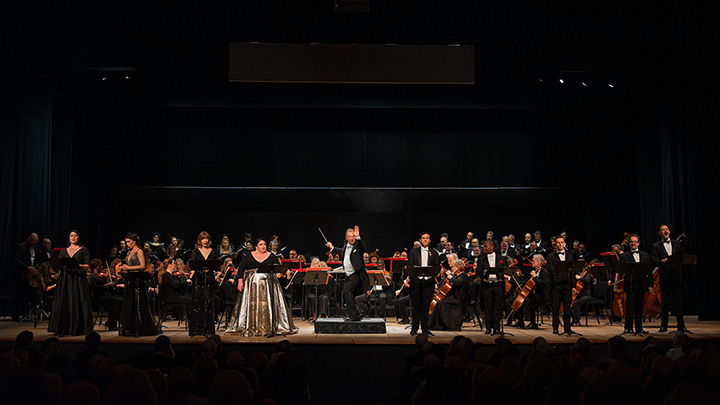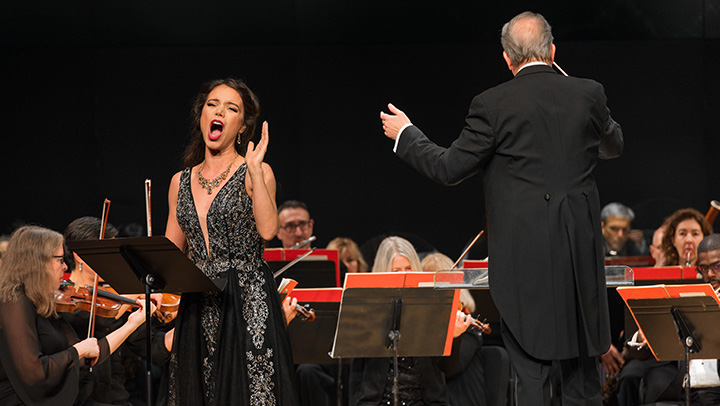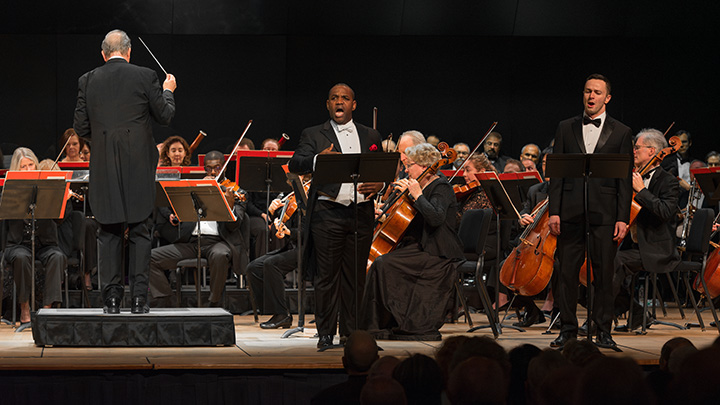
One of nine “seria” operas that Rossini composed for Teatro San Carlo between 1815 and 1822, Ermione was a failure at its premiere in 1819, its advanced perhaps a bridge too far for the Neapolitan public. Rossini reportedly defended the work as “my little Italian Guillaume Tell,” and guarded the autograph score throughout his life, though it would have to wait until 1987 to be revived at Pesaro following the development of a new critical edition. Major productions at Glyndebourne, Santa Fe, and New York City Opera, among others, have followed, though it remains a relative rarity.
Based on Racine’s 1667 drama Andromaque, a riff on Euripides, Andrea Leone Tottola’s libretto concerns a love quadrangle in the aftermath of the Trojan War. Enslaved Trojan princess Andromaca is committed to her dead husband Hector, but pursued by Pirro, King of Epirus. Title character Ermione, daughter of Helen and Menelaus, pines after Pirro and hates rival Andromaca. The Greek Oreste wants Ermione. Barring a few additional complications, the libretto is a lean exercise in mining these unhappy pairings for drama until we reach the tragic conclusion, in which Oreste stabs Pirro at Ermione’s behest.
Most importantly, the libretto is an efficient delivery vehicle for Rossini’s majestic score, which maintains a high degree of interest thought extended dramatic set pieces that bring together creative combinations of principals, ensemble and chorus. While the requisite coloratura flourishes make their appearance, they are integrated into the drama in interesting ways, complementing duets rife with conflict, psychologically compelling cavatinas, and powerful declamatory statements for the principals.
Rossini’s innovations announce themselves immediately with the absolute barn-burner of a scene for Andromaca which opens the work, executed here in a revelatory performance from Ginger Costa-Jackson. The mezzo-soprano offered a complete vocal and dramatic realization despite the concert setting, her glowing mezzo a compelling vehicle for Andromaca’s wounded dignity in the cavatina “Mia delizia,” as she debates Pirro’s offer to save her son by giving into his advances. From this moving statement she launched into an exhilarating vocal display, “Sposo! Ettore! io ti perdei,” interspersed with exclamations from the ensemble and chorus of Trojans.
Andromaca’s return at the outset of Act II finds her resigning herself to Pirro’s advances (and of course secretly planning to kill herself at the altar), in a duet with Pirro (David Portillo) that featured some of the most exciting joint coloratura execution of the evening. Here Ermione enters and just when we think we are going to get the cat fight duet the storyline has been building to, Andromaca unexpectedly declines a confrontation and walks off, telling Ermione “you don’t know the first thing about me,” a tasteful but perhaps unsatisfying mic drop.
Andromaca casts a long shadow over Act I, especially in a performance like Costa-Jackson gave here (Marilyn Horne sang the role in the 1987 production), and the action drags a bit as we learn about Ermione’s caustic displeasure with being wronged at the hands of Pirro, a less engaging plot point than Andromaca’s sympathetic conflict. Angela Meade, who has sung this role in a number of staged productions, sounded formidable in Ermione’s Act I music despite recovering from an upper respiratory infection per the curtain announcement. But a generalized sense of haughty resentment was not quite enough to solidify interest in Ermione’s early material, despite some attractive singing in places like in her gentle duet with Pirro “Ah! m’odia gia l’ingrato.”
Yet Act II soon reveals why Ermione justifies top billing, with an extended scena that follows the transformation of the character’s resentment for Pirro into a plot for deadly vengeance. Meade came out swinging in this music, employing the full range of her instrument, from rich chest voice to pealing top notes. She beautifully realized the character of the constituent pieces of this sequence from mournful resignation in “Amati, l’amai” to the unhinged finale “Se a me nemiche, o stelle,” unfurling waves of silvery sound over a furious orchestra as she doubles down on her resolve to see Pirro dead. Though, perhaps marshalling resources for the vocal performance, there was an element of dramatic continuity lacking in the overall presentation, leaving one intrigued to see how this marathon sequence comes together in a staged production.
Pirro, with his constant name dropping of father Achilles and boasting of favors he did for the Greeks against Troy, surely deserves a place somewhere on the list of most punchable characters in opera, as realized effectively by David Portillo’s preening characterization. Portillo deployed his golden-edged tenor with exquisite control throughout Pirro’s music, realizing intricate passages with remarkable consistency of tone. Despite the heavy demands of the role, Portillo maintained an unflagging sense of elegance and laser-focused fidelity to the figurative writing, perhaps most impressive in his execution of Pirro’s bravura Act I refusal of Oreste’s demand to kill Andromaca’s son.
This concert performance represented Lawrence Brownlee’s first assumption of Oreste, another of the virtuoso roles Rossini wrote for tenor Giovanni David that Brownlee has been traversing (he brought another David role, Rodrigo in Rossini’s Otello, to Opera Philadelphia last year). His explosive, ringing high notes and ability to lean into and energize the coloratura passages combined in a thrilling high wire act, particularly in the role’s prime showcase, “Che sorda al mesto pianto.” Brownlee brought a suitable grimness to the character, an avenging figure who brings death and destruction to the frivolous games of Pirro’s court, as matched by Brownlee’s vocal relentlessness in moments like the punishing repeated high notes in the Act II duet “Sei vendicata,” where he informs a suddenly horrified Ermione about the murder.
The supporting cast offered much to appreciate as well. Highlights included WCO veteran Matthew Hill, who shone as Oreste’s friend Pilade, his bright tenor weaving seamlessly with Brownlee in “Che sorda,” where he provides counterpoint to Oreste’s pyrotechnics. He also charmed in a second Act duettino with another WCO veteran, Matthew Scollin, who lent a warm bass sound to the ensembles as courtier Fenicio. Soprano Erin Ridge also impressed with her commitment and a sound that easily cut through moments like the Act I hunting chorus as Ermione’s maidservant Cleone.
Saturday’s show offered a delightful example of WCO Maestro Antony Walker’s ability to extract performances from his pickup orchestra that point to the possibilities of seldom heard scores. Walker’s fluid, propulsive reading kept the focus on the work’s drama and sheer entertainment value, skillfully balancing moody drama with burbling Rossinian charm. The Act I finale for the complete ensemble and chorus was the pinnacle among a series of smartly executed climaxes, Walker keeping a tight rein on the assembled forces while building to an irresistible conclusion. If the orchestra’s sound suffered from the occasional scrappy edge, their commitment to realizing the dramatic punch of Rossini’s score was unimpeachable.
The chorus, prepared by David Hanlon, shone in extensive passages that bring together the complete forces on stage, particularly the men who supply captured Trojan prisoners, Greek sailors, and other roles. Supporting the ensembles with a robust sound and clear diction, the choral work substantially enhanced the complex textures in these combined sequences.
Photos: Caitlin Oldham




























Comments